Why The Nissan Leaf Will Make You Want To Work Harder To Buy A Tesla
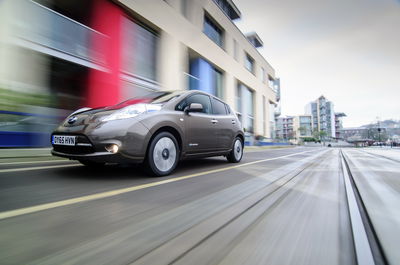
In the last five years we’ve seen a real change in attitude towards electric vehicles, no doubt helped by the success of the incredible Tesla Model S. In a very short period of time, Tesla has managed to convince buyers that electric power is now a viable alternative to the internal combustion engine by alleviating two main EV worries: range and performance. With the P85D boasting a 0-62mph time of 3.1 seconds (2.8 in Ludicrous mode) and a theoretical range of 305 miles, the car is now objectively comparable to a traditional super-saloon. Great news for those that can afford the £81,900 price tag.
For EV cars to become truly dominant, there needs to be an affordable mass produced alternative. This is where Nissan comes in. The Leaf, introduced in 2010, has been a sales success for the Japanese manufacturer, helping Nissan to secure a whopping 57 per cent share of the EV market. However, it’s not been plain sailing for Nissan. The company has struggled with changing the perceptions of potential first time EV buyers; convincing the public that a maximum range of 124 miles is practical - the reality being closer to 100 - is not an easy feat.
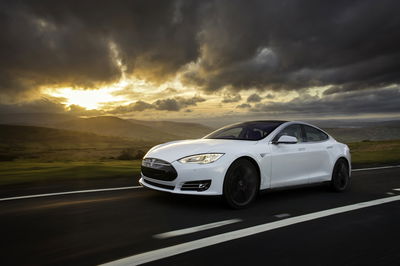
In order to put these range anxiety worries to rest, Nissan has released a new 30kWh version of the Leaf (up from 23kWh), increasing the theoretical range of the car to a much more respectable 155 miles. In Nissan’s press release it claims the new Leaf is now ‘a true alternative to an internal combustion engine’. A big claim, so we thought we’d test the new car to see if it really could replace your daily ride.
Does it look and feel high-tech?
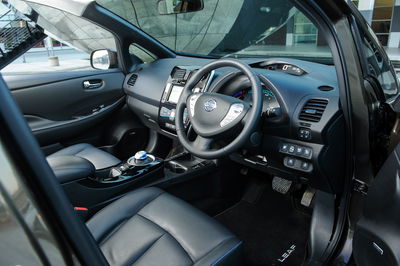
When a company introduces a new technology into the market place, it has to do something better or different to shake up the status quo. The general public doesn’t want to feel like they’re taking a step backwards. When electric vehicles were initially introduced, they got off to a rocky start, with one of the main problems being aesthetics. I mean, everyone understood why a G-Wiz made financial sense, but no one wanted to drive around in a glorified clown car.
So here’s Nissan’s first challenge. Does the Leaf make you feel embarrassed like a G-Wiz, or does it make you feel like you’re riding a wave of technology, like a Tesla? The answer lies somewhere in between. The exterior design is not particularly attractive, with the car looking distinctly overweight and bland. You’d be hard pushed to call it ugly, but it’s certainly not a pretty machine, and unfortunately for Nissan, things don’t get much better on the inside. I appreciate that the Leaf is designed to be an affordable family car, but the interior is just too dull for my liking. Everything is screwed together well, and the plastics are good quality, but the cabin ultimately feels like it was built for your 70-year-old gran.
This is a real shame for the Leaf because its closest competitor, the BMW i3, does a great job of making you feel like you’re driving a car of the future. The Nissan makes you feel like you’re driving a Micra, which really isn’t acceptable for a car that starts at £24,490.
Will it run out of battery?
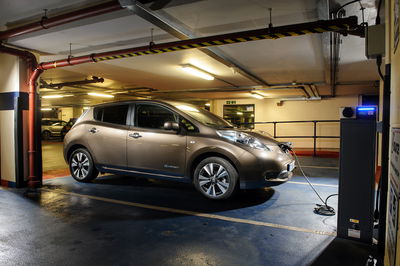
The team at Nissan has done an impressive job with the development of the new battery pack. By using higher density batteries, the company has improved the Leaf’s range by a whopping 25 per cent, giving the 30kWh version the accolade of having the best range in its class. For comparison, Germany’s best efforts, the e-Golf and the BMW i3, only achieve 118 miles on a single charge. A significant difference, and something buyers will have to take into account when comparing pure EV models.
On Nissan’s road route, which took in fast highways, town driving and B-roads, the Leaf performed admirably. Setting off with around 95 miles showing on the clock, I returned back to my starting point 55 miles later with approximately 30 miles still left in the tank (sorry, battery). Not bad when you consider that I was driving fairly hard on the undulating route. My only disappointment came towards the end of the route when out of sheer curiosity, my passenger looked up the nearest official charging station on the Nissan Connect EV sat-nav. We were a bit surprised to find out that the nearest station was further away than the range left in the batteries. Acceptable when you’re on a set route with a Nissan support team; a bit scarier if you’re on your own.
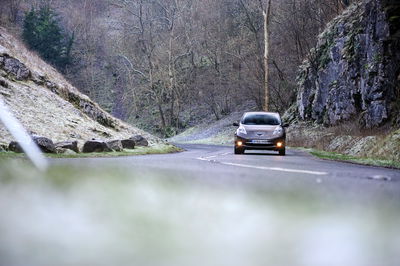
Even though we got back to the finish line with sufficient miles on the clock, the short route demonstrated that you’d struggle to use the Leaf as your only car. According to Nissan, drivers who own cars in the C segment drive on average 63 miles per day, making the Nissan’s range completely acceptable. But let’s face it, we all need to visit relatives or friends in far away places, and for that, the Leaf is effectively useless. Nissan has tried to tackle this problem with its ‘promise’ to lend you a petrol or diesel car, free of charge, for up to 14 days during the first three years of ownership. But who really wants to go through all that hassle?
Ultimately, the extra 25 per cent of range just adds that little bit of extra security. Most people would still have to own two cars in order to buy a Leaf.
How does it drive?
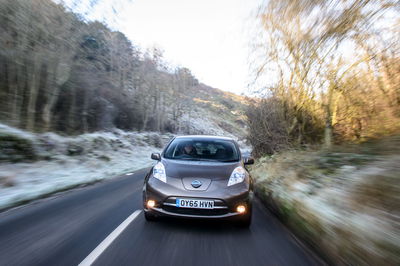
Unfortunately, the extra battery capacity does not result in better dynamic performance. The car still accelerates to 60mph in 11.5 seconds, and goes on to a ponderous top speed of 90mph. However, the car’s not as slow as you might think. With the instant surge of the electric motor, the Nissan feels fairly quick around town. Out of each roundabout and out of every junction it was possible to get the wheels scrabbling for grip, with the little orange traction control light frantically flashing away in the gauge cluster. Not something your gran is going to care about, but good to know nonetheless.
It was also surprisingly competent on the country roads around Silverstone. Granted, when I did start to push on the weight of the batteries was fairly noticeable (the 30kWh version weighs 21kg heavier than the 24kWh), with the car bouncing around on its springs. Stiffer dampers would certainly help, but let’s face it, no one is going to drive this car even remotely hard.

For a basic family hatchback I was really surprised with the car’s dynamics. It was also equally as impressive on the dual carriageway; with no sound coming from the Leaf’s motor, it was more relaxing at 70mph than the 1.4-litre petrol Golf I tested earlier last year. Shame, then, that the Leaf doesn’t have the range to make it a legitimate motorway cruiser.
Will it save me money?
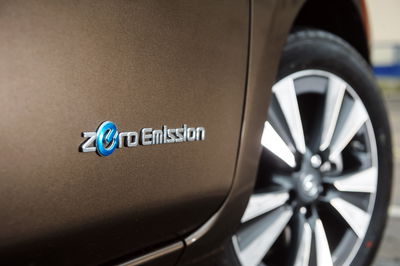
My biggest problem with the Leaf simply comes down to value for money. Nissan has put a lot of effort into building a solid support network for new Leaf owners. The battery receives an eight year warranty and owners receive free rapid charging at participating Nissan dealerships. The car should also cost you less than two pence for every mile travelled.
When you look at these facts the Leaf looks like a legitimate alternative to something like a diesel Golf. However, there is always a flip side, and in this case, it’s depreciation. After only a few minutes of searching the web, I stumbled across a 2014 Nissan Leaf with just over 8500 miles on the clock for under £7500. New, the car costs £20,790, so that’s a loss of over £12,000 in two years. Therefore, the money you make on fuel savings would go straight out of the window when you come to sell.
Should I buy one?
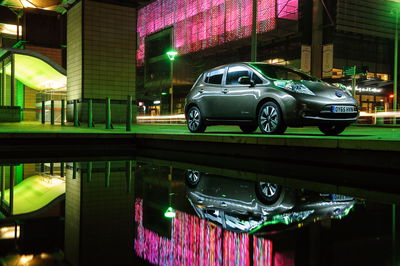
If you live in a city, don’t care about depreciation, and have access to another vehicle, then the Leaf is a viable option. But if you really want a ‘true alternative to an internal combustion engine’ then look elsewhere, because it only really works for a select few people. It’s also just too boring to be a ‘fun’ left-field choice; I’d happily take a quirky BMW i3 any day. It also doesn’t help that a diesel Golf or Audi does everything better than the Nissan, and if you really must go EV then both offer their own electrified alternatives with far more inviting interiors, less abrasive styling and an upmarket badge.
Yes, the Leaf is the best car in its class on paper, and yes, the technology itself is genuinely interesting, but I can’t help but think this is not the solution. I hope in the future Nissan can prove me wrong.

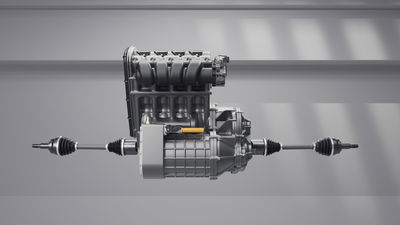












Comments
My beauty
As someone who owns an electric car.. in a word.. they are no where near what they need to be in order to take over as an alternative to a gas powered car..
In addition, do you notice how they never test these cars in the snow and cold weather?
Yeah, it’s because they get like 9miles to a charge when you have the heat on..
Don’t fall for the hype..
When I used to work for Nissan we had a LEAF as a pool car, and you are absolutely right - in winter when its sub zero temperatures and you have the lights and defrosters on, you end up getting utterly pathetic battery life. Hell, going WOT twice in a row actually ate a 1/4 of the battery life!
I don’t want a tesla i don’t want a leaf, I want tiny explotions in my engine and the smell of dead dinosaurs in my tank!
i want POOOOWEEEEEEEEEEEEEEEEEER!!
ib4 “teslas power” Nyet, no sound no power, thats 100% science!
I would definetly LEAF it for a tesla
COTD!
Until electric cars can be charged in 5 minutes/30 minutes like a normal car without killing the battery they won’t properly take off. People realise that once you run out of juice it takes hours to recharge, ok if you only commute in the city and never use the daily range however if you want to go further afield it’ll take much longer than a petrol car due to the mid-journey charge time
You couldn’t pay me yo buy a Nissan leaf 😂😂
Why not a Chevy Bolt and/or Volt?Chevy Volt: 40+ MPG, 54 miles of pure electric, but considering its Chevy, that number is on the conservative side. Reliability on par with the Prius, and the second highest rated customer satisfaction for a vehicle according to Consumer Reports (only the Tesla Model S is higher). In addition, many reviewers and owners say it is a joy to drive, unlike the Prius and Leaf. Like Tesla, Chevy uses liquid cooled batteries that dramatically increases the lifespan of the battery, and even the oldest Volts out there are still keeping a majority of their range.Best of all, here in Freedom Land, it is roughly the same price as a Prius.
Chevy Bolt: 200 miles advertised of range (again, probably more in reality). In Freedom Land, it will be priced at $30k, which is the average price of a new car.It will also be sold later this year.
I’ll just go with a hybrid.
Who took that last pic because daaamn
https://m.youtube.com/watch?v=NCdLFhUmubc
Pagination